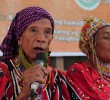“… The difference between rape in films and marital rape is that we cannot scream, as our child might wake up in the other room. Or our child is right there next to us, her or his face distorted with terror. And another difference is that the person who does this to us is someone we used to love, someone we once trusted more than anyone else. And there is another difference, too: that others say that we invented the whole thing…”
A victim of rape in the home
“…At least 85 per cent of them are whores. They wanted to have sex, but then do not manage to come to an agreement. They are prostitutes, overtly or secretly…”
A police officer and advisor on rape issues
Two thirds of sexual crimes in Hungary are committed by people known to the victim, yet few of the perpetrators are tried for their crimes, Amnesty International said today.
Widespread prejudice, government inactivity and deficiencies in the criminal justice system pose at times insurmountable obstacles for women to obtain justice or redress, according to the organization’s latest report, Hungary: Cries unheard: The failure to protect women from rape and sexual violence in the home.
“In the confines of the family, rape is one of the many forms of violence women may suffer — and they may be subjected to it time and again,” said Nicola Duckworth, Europe and Central Asia Programme Director at Amnesty International.
“Rape in intimate relationships is a crime. Stigma and ridicule from the community and lack of confidence in criminal justice system and health services officials must not prevent victims from obtaining justice.”
In 1997, rape within marriage was recognized as a crime within the Hungarian Penal Code. However, the most serious failing in the Penal Code�s definition of rape is its requirement that women must prove that they physically resisted, no matter the level of threat or violence that they face. This stipulation leaves unprotected thousands of women in intimate relationships.
A large number of cases fail to reach court or do not result in criminal convictions. Either the crime is not reported, or the police fail to identify the attacker and label the case as a “false report”. Sometimes, the victim or other witnesses withdraw their statements or decline to press charges under duress.
Women are reluctant to report rape because they may fear the abuser, most often the husband or a former partner, will attack her again. The reporting procedure is humiliating and may further discourage the victims from taking legal action. Police officers frequently do not conduct a proper investigation with victims and potential perpetrators not interviewed and forensic evidence not gathered properly. Police investigations are also often marred by prejudice.
In court, in the presence of their attackers, women have to relive time and again the horror of the sexual attacks they were subjected to and to prove their innocence. They have to challenge public attitudes that it is acceptable for a husband to force his wife to have sex and that it is the woman who provokes rape. Such attitudes prompted a Hungarian woman judge to tell Amnesty International that she herself would be reluctant to report rape.
Rape in the family is rarely discussed publicly. Victims are rarely heard to speak about the physical and psychological injuries they experience. The number of studies on this issue is extremely small. A 2006 public opinion revealed that 62 per cent did not know that marital rape was a crime.
“The government must take the lead in lifting the cloak of silence and denial over this human rights violation that has a devastating impact on women’s lives,” Nicola Duckworth said.
Amnesty International calls on the Hungarian government to:
* Ensure legislative changes that would guarantee access to justice;
* Provide standards and training for professionals working with victims of sexual crimes;
* Set up support services for victims of sexual violence;
* Carry out research and compile data that will inform policy making;
* Actively combat social prejudices through public education.
See: Hungary: Cries unheard: The failure to protect women from rape and sexual violence in the home, (AI Index: EUR 27/002/2007) http://amnesty-news.c.topica.com/maago9babyrjJcfVAaub/
This report is part of Amnesty International’s campaign Stop Violence Against Women.
****** INBOX is an archive of press releases, statements, announcements, letters to the editors, and manifestos sent to Davao Today for publication. Please email your materials to davaotoday@gmail.com. Davao Today reserves the right to edit or refuse material for publication. *****










